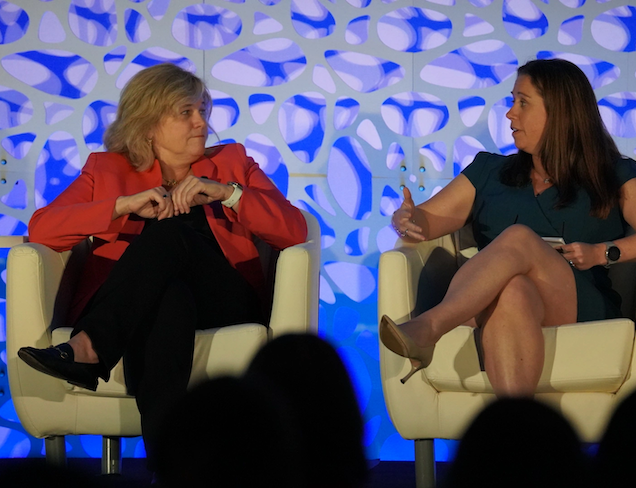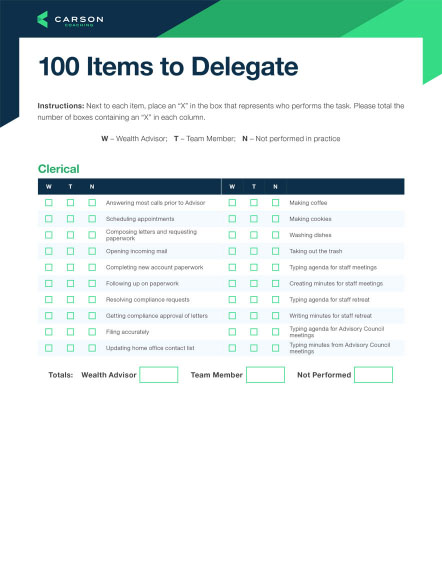Once, Franklin Templeton CEO Jenny Johnson’s CEO update to the board of directors included a slide depicting where Johnson thought the business was going and leading indicators for what next year might look like.
After she finished her report, one board member said, “That was a great slide that Matt presented.”
Here Johnson was, the CEO, having her work credited to her male direct report, the CFO.
“I was like, ‘I’m the CEO, and still the male’s getting credited – who reports to me,’” Johnson told the crowd at the 2023 Excell Represent fireside chat with interviewer Erin Wood. “Those things are realities.”
Johnson acknowledged that the gentleman didn’t intend to do it, but it really showed that oftentimes people tend to have unintentional biases, and this is where allies and sponsors can really play a role.
In that case, Johnson said it would have been helpful to have a male ally say, “You mean the slide that Jenny presented?”
For much of her career, those sponsors have been her father and her brother, who have both served in various leadership roles at the company founded by their family.
But finding your allies and sponsors isn’t the only wisdom Johnson shared from the stage that day. Let’s dive into five lessons that we took away from Johnson’s interview that you could use in your career and firm.
No. 1: Rely on Your Team and Leverage Their Strengths
Johnson made headlines when she won the Bloomberg Brackets for a Cause, picking the winning bracket for the men’s NCAA basketball tournament. Participants pay a $20,000 fee, and that money gets donated to the charity of their choice if they finish in the top three.
Well, Johnson finished first – in her first time competing.
“I crushed it,” she said with a laugh. “There were so many upsets.”
The headlines read, “Franklin’s Johnson Bests [Bill] Ackman,” founder of Pershing Square Capital Management, who was the favored winner. And she wasn’t the only winner – her charity of choice that received the cash was Girls Who Invest.
“People started asking why I chose my picks, and I was like, ‘It’s a team sport,’” she explained. She didn’t follow college basketball – she didn’t even play. So just like all the other CEOs and leaders in the competition, she leveraged her quant team and they helped her make the winning picks.
The takeaway: Lean on your team and their strengths to help you and your firm achieve success.
No. 2: Use Your Power for Good
In addition to winning that bracket in 2021, Johnson convinced the Bloomberg team to also include a contest with the women’s tournament.
“It took me a couple of years to convince Bloomberg, but I finally said, ‘You guys, it’s embarrassing. The world is talking about trying to get more women in asset management and you’re not even covering the women’s bracket. You should add it,’’’ Johnson said.
So they did. And the first year, Johnson turned over the task to her head of DEI, who was a former basketball player, who chose her winning picks.
Another time, Johnson used her power for good to create a first-of-its-kind women’s event at the Future Investment Initiative (FII) Institute conference, held in Riyadh, Saudi Arabia, which she explained is trying to become the “Davos of the desert.”
“It’s a great place to go because all your clients, every sovereign wealth fund globally is there,” Johnson explained, adding that the gathering isn’t about Saudi Arabia or politics, but rather about convening people.
In prior years, she felt she needed to advocate for creating a women’s space at the event. So at a Milken Institute event, she connected with Saudi Arabia’s Minister of Investments and expressed interest in sponsoring a women’s event at the FII Conference.
“He loved it,” she said. “And he ran with it.”
And this year, the very first all-women’s panel tacked the topic “How to Ignite the Gender Equity Moonshot,” which was moderated by HRH Princess Reema bint Bandar Al Saud. The evening of the panel, there was a gala to celebrate the achievements of women in Saudi Arabia and the world.
The takeaway: Use your voice and your power to break barriers and do things never done before, even if at first it might seem impossible
No. 3: Leverage Data to Anticipate Client Needs
Back in the 1980s, when Franklin Templeton made a foray into banking services, Johnson learned a ton, but specifically that banks during that time were really the first industry in financial services to leverage data to try to predict client behavior.
“I watched as banks ended up selling off their credit card business because they couldn’t compete with the likes of Capital One or Citi,” who were great at leveraging data to predict behavior, she said. “The playing field has been leveled since then, but it was amazing to see it happen, and it made me a big believer in that data was going to become more and more important.”
She gave examples of how banks could predict if customers were going to default based on things like they didn’t capitalize the name of their employer on the application, or if they were going to make their loan payments based on their FICO score.
“Being able to dig into massive amounts of data is going to change some investment decisions,” she said, adding that coupling data with AI and blockchain technology can change the game even further when it comes to client service and investment management.
“Blockchain is just a very efficient way to do transactions,” she noted. “It takes a lot of friction out of a transaction.”
The takeaway: Collecting and analyzing data to help you anticipate what is next for clients could be a game changer in both service and retention. Plus, it might make things a little smoother for you.
No. 4: Position Your Firm for the Future by Focusing on Disruption
Johnson says that as CEO, she spends about a third of her time on disruption.
“I want to think about how the company has to be positioned for that next generation,” Johnson said, adding that the amount of time she spends integrating digital assets and blockchain likely won’t pay off for Franklin Templeton until the next decade. “But if we don’t make sure that we are thinking about it and building it into our DNA, we’re not going to be there in that next generation.”
She noted in the talk that though Franklin Templeton is a public company, it is still a family company. And when it comes to family companies, there’s a saying in the U.S., she said, that goes: “T-shirts to t-shirts in three generations.” In Holland, the saying is: “Clogs to clogs in three generations.” In Asia, it’s “Rice paddy to rice paddy in three generations.”
“Rarely does a business make it to the fourth” generation, Johnson said. “The legacy I want is to make sure there’s a healthy company for the fourth generation.”
She noted that the reason companies – specifically incumbents who have seen great success – fail is because they only incrementally improve and shy away from disrupting themselves. But they need to disrupt themselves to evolve and continue to succeed.
The takeaway: Disrupt yourself and continue to find new, innovative ways of doing business for the longevity of your firm – especially if you are a family business.
No. 5: Give Back, But Take Care of the Things that Are Important to You
Over her career, Johnson has served on numerous non-profit and charitable boards, plus she gives generously to charities. But recently, she’s reduced the number of things she focuses on and narrowed it down to Catalyst, which helps get more women in senior leadership positions; Sloan Kettering Cancer Foundation Board; and Thermo Fisher Scientific.
Johnson is passionate about watching what’s coming next in medicine for many reasons, but primarily for two reasons – she lost one of her brothers to pancreatic cancer, and her son was diagnosed with Type 1 diabetes at the age of 10.
“It was a shocker, because we didn’t have it anywhere in the family,” Johnson explained. “And so when he was diagnosed, his life expectancy was reduced by 15 years. That now is down to less than seven years difference because of some of the things that they are doing.”
While she’s been able to see Sloan Kettering come out with a pancreatic cancer vaccine, she’s eagerly looking forward to strides made in pediatric diabetes research.
The takeaway: Give back to causes that are important to you, but pull back and focus on only the most important ones when you feel it’s time. We only have so much to give.
Slow Progress is Still Progress
Johnson is a “second-generation guilty mom.” Her mother went to Stanford Medical School, and there were only 10 women in her class. Now, more than 50% of medical students are female.
“So there is a change [that’s happening],” Johnson said. “It just sometimes feels like you’re watching paint dry.”
As she talked about the importance of male allies, she also mentioned that they can help out generations of “guilty moms” by normalizing caring for their children also.
“For the men in the room, one of the best things you can do for your female colleagues is actually say, ‘Hey, I’ve got to leave the office early today because I’m going to take my son to the dentist.’ Or, ‘I’m going to leave the office early today because I’m going to go coach my daughter’s soccer team,’” Johnson said. “That gives women – and other men – permission and normalizes it.”
Let’s all – men and women alike – take Johnson’s lessons and put them into action to enrich the financial services industry and make it a more inclusive place and offer a better client experience.


